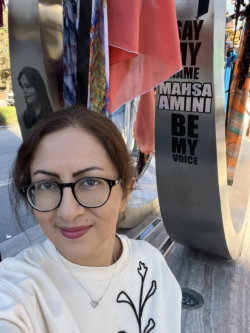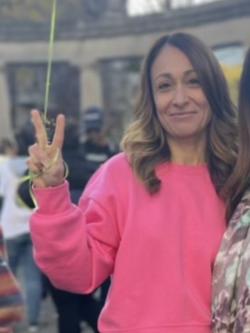How the 2022 Iran Uprising Affects Your Employees — And How You Can Support Them (Blog Post)
Sherazad Adib and Negin Sattari, PhD, two Catalyst staff members of Iranian descent, call on leaders to support employees during this unique moment.
The detention and death of the young Kurdish Iranian woman Mahsa (Jina) Amini at the hands of the morality police over the way she wore the headscarf created a shock wave in Iran, leading to a historically unique movement seeking social, political, and economic freedoms for women. Of Kurdish origin, like Mahsa Amini herself, the slogan “Woman, Life, Freedom” (“Zan, Zendegi, Azadi”) has become the rallying cry of this movement.
This movement is led by women who, for 43 years, since the Iranian Revolution of 1979, have seen their rights and freedoms violated by a state that imposes the veil, limits their access to the labor market and political power, and enforces humiliating laws such as requiring husbands’ permission for married women’s travel. The government continues to crack down on the uprising and is sentencing to death those who peacefully protest.
This uprising has impacted Iranians across the world, many of whom are employees of global workplaces. The Iranian diaspora is very involved and engaged in the Woman, Life, Freedom movement, participating in some of the largest rallies of the past four decades arranged in dozens of cities across the world. Iranians outside Iran also are pushing for international communities’ attention and support through social media engagement and petitioning.

This involvement inevitably influences the lives of Iranians abroad who continue to go to work every day. It is fair to say that members of the Iranian community who are employed are currently working in a second job.
Like millions of people of Iranian origin, the two of us, both members of the Catalyst staff and community, follow the news from Iran every day with concern and hope. Because the Iranian regime has restricted access to the internet, we add our voices to the movement by relaying information on social media and making sure the world is aware of the struggle of women and all people in Iran.
Sherazad has called for solidarity with Iranian women through her media interventions. She has shared her experience with the morality police who stopped her in Iran while she was eight years old and walking down the street with her mother and was told to wear the veil in public. This happened a few years after the 1979 revolution.
We are privileged for not being exposed to violence and threats faced by protesters and not having to shoulder the economic consequences of these events. However, our mental health is challenged, as we have difficulty concentrating, and our stress level is at its highest—not surprising in light of the fact that we are helplessly witnessing the arrests and murders of young people, including many children, who are peacefully demonstrating for their freedoms.
The future seems uncertain, and many Iranians overseas like Negin have had to reconsider plans for traveling home and reuniting with their family after being separated for years. Most of us have family members, friends, or others in our expanded social networks inside Iran who are out on the streets, chanting for freedom from their homes at night, removing their headscarves in public as an expression of protest, or simply yearning for meaningful changes in their lives.

The institutions that shaped our lives and identities back home, like our schools and universities, are venues for expressions of dissatisfaction, anger, and hope for change. We have memories both sweet and bitter of the times we had hoped to be part of this change, the times when we still hoped that leaving our home behind did not have to be the best option to pursue a better life. These layers of emotions find their ways into our day-to-day work life with an impact on how we show up at work.
We call on company leaders to recognize the movement in Iran and its impact on employees of Iranian origin. Courageous leaders committed to DEI acknowledge important moments that call for action in solidarity with employees of diverse backgrounds and identities as a gesture of inclusion. Now is one of those moments.
Leaders, we ask you to help create a safe and inclusive space for employees of Iranian descent to express themselves and find the comfort and support needed to get through this difficult time. Allyship is one of the elements of inclusive leadership that has been identified by Catalyst research. Empathy is also crucial right now. Above all else, we remind you that Iranians, like other people of colour, can be impacted by emotional tax and may experience being on guard at work. The Woman, Life, Freedom movement is adding another layer of challenge for us to show up at work.
If you are truly committed to DEI, now is the moment for you to step up. Even if your organization does not have a physical presence in Iran, the current protest movement has ripple effects across the globe and within your organization. This is an opportunity to walk the talk.
Sherazad Adib
Senior Director, Corporate Engagement
Sherazad Adib manages Catalyst’s relationships with its Supporters in Quebec. As such, she is responsible for supporting members and building strategic partnerships to encourage the advancement of women and workplaces. She has more than 22 years of experience in the corporate social responsibility and responsible investment fields. Her experience working with large Canadian corporations in the entertainment, telecommunication, and retail sectors included companies such as Cirque du Soleil, Bell Canada, and RONA. Her experience has led her to develop, manage, and implement various CSR projects and to participate in numerous industry-based initiatives. She also started her career by co-founding an advisory firm in Montreal called Responsible Investment Group (GIR) providing institutional investors with tools and research on ESG (environmental, social, and governance) issues. She is currently a Board member of Agence de mobilité durable. Sherazad holds a Master’s degree in Sociology from the University of Montreal and a Master’s degree in Management (MSc) from HEC Montréal.